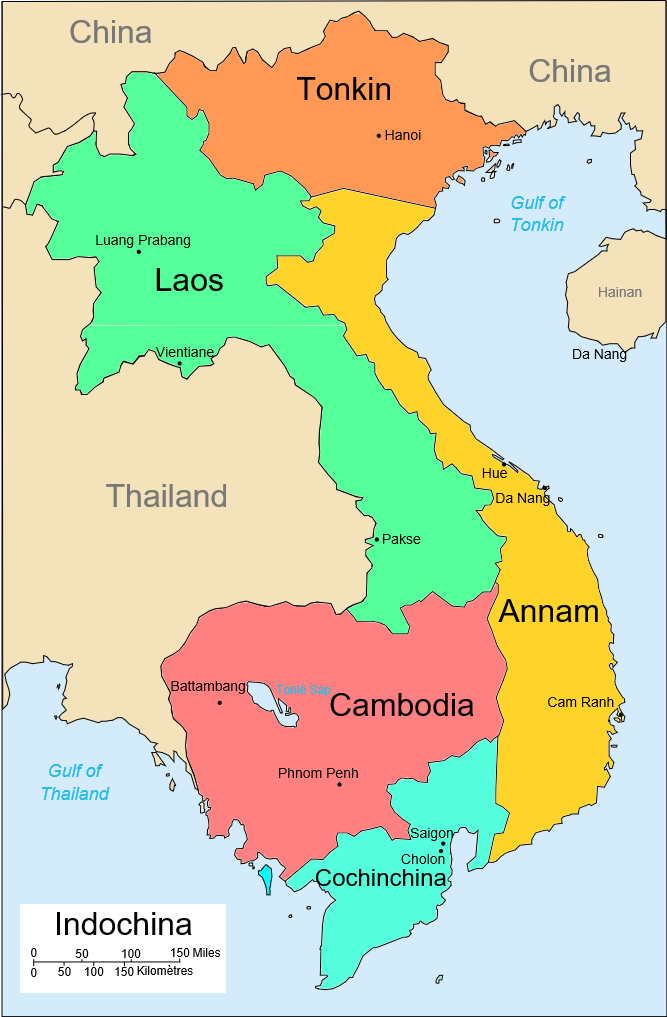Against these new soldiers General Bouet delivered his attack in vain, and at length he was obliged to retreat within the defenses of Hanoi.
Continuing France Acquires Vietnam,
our selection from Europe and the Far East by Sir Robert Kennaway Douglas published in 1904. The selection is presented in five easy 5 minute installments. For works benefiting from the latest research see the “More information” section at the bottom of these pages.
Previously in France Acquires Vietnam.
Time: 1882
Place: Hanoi

CC BY-SA 3.0 image from Wikipedia.
But Riviere had got the bit between his teeth, and though restoring part of the citadel he refused to evacuate the key of the position. In this dilemma Tuduc appealed to Peking for aid against the invaders, with the result that the Chinese garrisons at Bac-ninh and Sontay were strengthened, and the “Black Flags” — a guerilla force of bandits — were encouraged to attack and molest the French. Meanwhile reinforcements from France began to arrive; and Riviere was once more able to take the field. With the assistance of the navy he captured Honggai, at the mouth of the Bay of Alung, and then proceeded to attack Nam-dinh. This fortress he also took, and further succeeded in resisting an attack upon Hanoi undertaken by a combined force of Chinese and Vietnamese. But the enemy, though defeated, were nothing daunted. They renewed their attack, and harassed the invaders by cutting off small detachments of isolated men. Animated by an intense hostility, they issued a proclamation ad dressed to the “French freebooters,” warning them that if they did not evacuate the land they would be destroyed in a general cataclysm. With the intention of fulfilling their own prophecy, the Vietnamese renewed their attack on Hanoi — an effort which, though defeated, showed the defenders that their situation was one of great danger.
Fully alive to the importance of doing something to check the power of the enemy, Riviere determined to make an attack on Phuhoai, a stronghold in the direction of Sontay. At the head of a force consisting of four hundred marines and one hundred sailors he marched to the attack. For a time all went well; but at a point where the small column encountered some marshy. ground a heavy fire was opened upon it by a concealed party of sharpshooters. This sudden attack threw the column into confusion; and, though Riviere and the other officers did all that was possible to restore order, the confusion became worse confounded and ended in a complete rout. Four officers, of whom Riviere was one, and fifty men were left dead on the field; and the remainder of the expedition, hotly pursued by the “Black Flags,” stayed not their flight until they reached the shelter of the citadel of Hanoi. A few days before the catastrophe the French Chamber had decided to send reinforcements to Tonquin, and had voted a million dollars for the required operations.
The position of the French in Tonquin was now sufficiently grave, and active preparations were made in France to meet the difficulty. General Bouet was put in command of the troops, and M. Harmand was appointed Civil Commissioner. The policy pursued by General Bouet was to await the arrival of the reinforcements before taking the field, and meanwhile to fortify the positions occupied. This attitude was rightly regarded by the Vietnamese as a sign of weakness; and, encouraged by the General’s inaction, they attacked the garrisons of Haiphong and Namdinh. These onslaughts were successfully resisted; and a sortie was made which had the effect of clearing the neighborhoods of the fortresses from the enemy’s sharpshooters.
On arriving at Hanoi M. Harmand at once issued a proclamation “to the men of the people, the merchants, learned men, and mandarins of Tonquin,” in which he lauded the power and good intentions of France, and declared his desire to restore peace to their much-distracted country: “Our intention never has been to conquer your country. France wishes only that the mandarins governing you shall be men of justice and integrity. We mean also to make the taxes that you pay serve to ameliorate the condition of your country, to increase its general welfare, and to insure the safety of the people and of commerce, which will be free in the interior of all the provinces.”
This proclamation in no way softened the opposition of the Vietnamese to the presence of the French and they vowed their intention to drive the barbarians into the sea. So actively hostile did the enemy show themselves that General Bouet determined to lead a sortie against them. At the head of fifteen hundred men he led an attack on the villages surrounding Hanoi, and to his surprise found that the Vietnamese forces, backed by up Chinese troops, formed a very different material from that which had been presented by the bandits who had been accustomed to fly before Gamier’s and Riviere’s small bands of marines. Against these new soldiers General Bouet delivered his attack in vain, and at length he was obliged to retreat within the defenses of Hanoi. In face of this defeat it was some consolation to the disheartened Frenchmen to learn that the important towns of Haid-zuong and Pleubinh were captured by another detachment.
The arrival of seven thousand men from France encouraged M. Harmand to send an ultimatum to the successor of Tuduc, who had lately died at Hue. In this document he demanded the King’s instant assent to the fulfilment of the Treaty of 1874, and the acceptance of the French protectorate over Tonquin.
| <—Previous | Master List | Next—> |
More information here and here, and below.
 |
We want to take this site to the next level but we need money to do that. Please contribute directly by signing up at https://www.patreon.com/history
Leave a Reply
You must be logged in to post a comment.